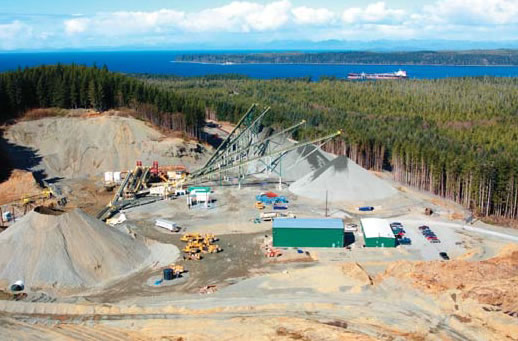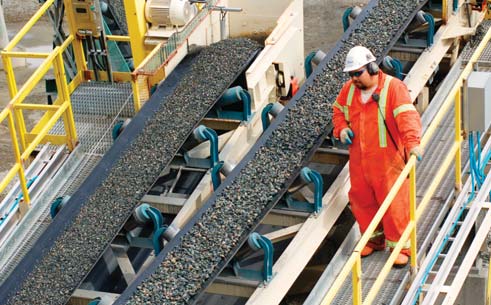Orca Sand and Gravel Project - British Columbia
PDF version (301 kb)
Partnership Agreements
The Lands and Minerals Sector of Natural Resources Canada promotes the participation of Aboriginal communities in minerals and metals activities across Canada by sharing information on Aboriginal-industry leading practices.
Project
Located near Port McNeill, British Columbia, on Vancouver Island's northern coast, the Orca Quarry is jointly owned by Polaris Minerals Corporation (88%) and the 'Namgis First Nation (12%). Orca started commercial production in early 2007 and is expected to become Canada's largest sand and gravel quarry by the time it reaches full production. The Orca deposit hosts reserves of 121 million tonnes (Mt) of sand and gravel, with an expected operating life of more than 25 years. With a dedicated ship-loading facility capable of loading 70 000-t ships and smaller barges, and a plant capable of producing in excess of 6 Mt annually, the quarry has signed a number of long-term sales agreements to provide sand and gravel to major concrete producers active in residential, commercial, and infrastructure construction in the U.S. west coast, Hawaii, and coastal British Columbia.

Partnership Agreements
In September 2001, prior to exploring for sand and gravel in the traditional territory of the Kwakiutl and 'Namgis First Nation, Polaris Minerals Corporation explicitly recognized the communities' Aboriginal rights and title, and expressed its interest in working closely with them during the evaluation and planning of the project, and ultimately in forming a business partnership. Following more than a year of negotiations, the 'Namgis Council and community ratifi ed a Cooperation Agreement and an Impact and Benefits Agreement. The Kwakiutl First Nation participates in the project through an Impact and Benefits Agreement. This unique First Nations partnership agreement set out employment and training commitments, environmental standards, and commitments by Polaris to cover the cost of First Nations participation in the planning and evaluation of the project. In April 2005, 'Namgis and Polaris formalized their relationship through the creation of the Orca Sand and Gravel Limited Partnership to develop the quarry. As 12% partners in the project, 'Namgis contributed $495 000 in support of development costs and borrowed more than $6 million from a Polaris subsidiary. This loan is to be repaid with 'Namgis's share of the quarry's profits, a stipulation that provides protection for the community's assets should Orca experience financial problems. 'Namgis's cumulative share of the Orca Quarry before tax income has been independently estimated at over US$84 million.
Employment and Training
The agreements between the First Nations and Polaris established preferential hiring for qualified local members of the Kwakiutl and 'Namgis First Nation; this includes preferential hiring by contractors and suppliers to the project. The quarry set a goal of recruiting local 'Namgis and Kwakiutl members for at least 50% of the jobs available at all levels of the operation from project construction to reclamation after its eventual closure. As of early 2007, 15 of Orca's 29 employees were Aboriginal, with 8 of them coming from the 'Namgis First Nation; these employees worked as production staff . The other 7 Aboriginal employees at Orca were Kwakiutl members. Employees are invited to participate in a company-sponsored pension plan with Orca matching employee contributions of up to 3% of gross pay to a group Registered Retirement Savings Plan. With a long-term goal of having 'Namgis employees working at all levels of the operation, Orca also reports on its training program, which had provided more than 7000 hours of training by the end of 2007.
Economic/Business Development
In its agreement with the local community, Polaris made a commitment to encourage the formation and development of locally owned businesses and pledged to buy goods and services from local businesses on a preferential basis. During construction, the company paid more than $242 000 to contractors and employees from the local community of Alert Bay, putting Orca among the community's top 10 employers, according to the 'Namgis First Nation's 2007 Report to the Community. Additionally, numerous contracts have been awarded to local companies for land clearing, steelworks, electrical work, power engineering and installation, ship-line handling, construction and site preparation, amongst others.
Social, Cultural and Community Support
Polaris has also made a commitment to create several community funds to be financed by a $0.09 per tonne royalty ($540 000 per year at full capacity) to fund local community educational, cultural, recreational, health, social, and environmental initiatives. The company has also contributed books to the T'lisalagi'lakw School; made a $5000 donation to the Lawrence Ambers Memorial Scholarship Fund; made numerous donations in support of cultural, recreational and sports programs; and donated a large orca mask carving that now hangs at the entrance to the 'Namgis council chambers. A Social Impact Assessment conducted prior to the quarry's construction in 2004 identified a number of impact areas. The question of where workers choose to live was raised as a key issue, with tracking under way to determine whether 'Namgis members are moving out of Alert Bay as a result of their long-term Orca work commitments and what impact this has on the community.
Environmental Protection

Prior to quarry construction, Polaris spent $1.6 million to clean up an abandoned dump site that was nearing contact with the Cluxewe River due to erosion. During construction of the loading dock, efforts were made to lessen the impact of noise and sediment disturbance by using specialized equipment and by ceasing operations when local fish populations were known to be in the area. New habitat was also created to compensate for potential harm to the marine environment, with Polaris building a 337-m2 reef as a replacement for an 87-m2 that was disturbed by construction. The company also out-planted numerous local abalone shellfish to repopulate the reefs. The processing plant does not use any chemicals, and features a closed-circuit water-recycling system to ensure that no process water is discharged into the environment. The system includes a filtering process that eliminates the use of settling ponds, minimizes silt handling and clean-up costs, and allows for the silt to be used to beneficiate the soils during reclamation. As part of progressive site reclamation at Orca, soils salvaged ahead of the mining advance will be hauled to areas ready for reclamation. Seeding and planting of native trees and plants will also be undertaken.
Moving Forward
The Orca Quarry is currently shipping aggregates to California, Vancouver, and Hawaii. It is expected to become one of the largest and most cost-efficient quarries in Canada with an anticipated life of decades.
For more information, contact:
Marco Romero
President & CEO
Polaris Minerals Corporation
1055 West Georgia Street, Suite 2740
PO Box 11175
Vancouver, B.C. V6E 3R5
Tel.: 604-915-5000
E-mail: Marco Romero
Photos courtesy of Polaris Minerals Corporation (used with permission).
2008
For more information on Aboriginal communities and mining, visit the mining and materials web site or contact us.
Page details
- Date modified: